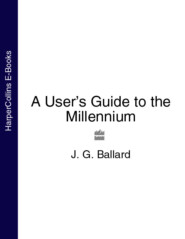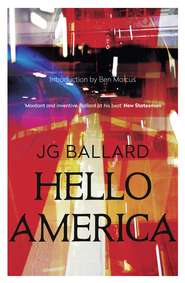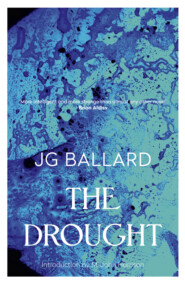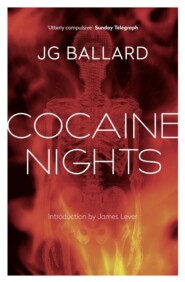По всем вопросам обращайтесь на: info@litportal.ru
(©) 2003-2024.
✖
The Day of Creation
Настройки чтения
Размер шрифта
Высота строк
Поля
17 Escape
18 The Green World
19 The Lanterns at Dusk
20 The Documentary Film
21 The Skirmish
22 Into the Lagoons
23 Journey Towards the Rain Planet
24 A Dream of Fair Women
25 The Wildfowlers
26 The Gardens of the Sahara
27 The Stolen Channel
28 Doctor Mal
29 The Blue Beaches
30 The Arcade Peep-Show
31 The Death of the Diana
32 The Poisoned Valley
33 The River Search
34 The Source
35 Memory and Desire
Interview with J. G. Ballard
About the Author
By the Same Author
About the Publisher
Introduction (#u5f39b0b7-882f-5752-a843-9ac082793201)
by Joshua Cohen
1
‘Dreams of rivers, like scenes from a forgotten film, drift through the night, in passage between memory and desire.’
Or, better, let’s set it like a poem:
Dreams of rivers,
like scenes from a forgotten film,
drift through the night,
in passage between memory and desire.
Now it reads less like a first sentence – which it is, the first sentence of J. G. Ballard’s The Day of Creation – and more like the novel’s displaced epigraph.
Now we can begin, and I’ll gush about this and leak about that and then this introduction will trickle to an end and you’ll begin the novel proper only to find that sentence again and perhaps you’ll feel – perhaps you’ll feel now that I’m exhorting you to – the prosodic ebbs and flows of water. The opening sentence of Finnegans Wake is the continuation, the circumfluence, of its closing sentence. Joyce’s first page begins: ‘riverrun, past Eve and Adam’s, from swerve of shore to bend of bay, brings us by a commodius vicus of recirculation back to Howth Castle and Environs.’ His last page ends: ‘A way a lone a last a loved a long the’
No capitalization at top, no punctuation at bottom.
Of course, Joyce also wrote poetry and his prose was ‘poetic’ – whereas we read Ballard for a pitilessly mass-produced language more suitable to ‘the contemporary’. Or we assume we do (or we assume pitiless mass-production is more suitable), because the stark sad thingness of drainage culverts and overpasses and parking lots and empty swimming pools – empty except for the junkfood wrappers and condoms and cigpacks and bottles – too often overwhelms the ambient mosquito music abounding.
Prose lets us see and poetry lets us hear but the best of both do both at once, though so does 3D IMAX with Dolby Digital.
So, ‘like scenes from a forgotten film’ – what does Ballard mean? Who forgot this film and why? Rather, is this line disposable? Or is a brackish meaning bubbling behind it? In film, by which I mean mostly in Hollywood, when everything’s been shot and edited and even reshot and re-edited and test audiences still can’t understand what the hell’s going on, directors or, frequently, producers in conflicts with their directors, seek to salvage the thing either by introducing voice-over – from the hero, perhaps, or an omniscient God-narrator, explaining, ‘An hour before dawn, while I slept in the trailer beside the drained lake, I was woken by the sounds of an immense waterway’ – or by slapping together a title card that proclaims: ‘Africa, The Present.’
‘Like scenes from a forgotten film’ strikes me as Ballard’s equivalent of this technique. The line introduces a first-person narrator (first-person is literature’s overdubbing), while it also serves to reorient – or deoccident – you, the reader, for whom film, or TV – the screen – has become so primary a medium as to be beyond second nature: The mediation has become Nature Itself.
After that line Chapter 1 continues its cinematic panning:
As on all weekend visits to the abandoned town, I was seized by the vision of a third Nile whose warm tributaries covered the entire Sahara. Drawn by my mind, it flowed south across the borders of Chad and the Sudan, running its contraband waters through the dry river-bed beside the disused airfield.
But everything’s so vivid that you’d be forgiven for not having noticed that the theatre you’re in is still just a skull: one man ‘seized by the vision’, a Nile ‘drawn by my mind’. It’s as if we have to be ensconced in an imitative darkness before that line about film is granted its literal justification, in the midst of the chapter: refugees from the Sudan are feeding campfires with wood stripped from a police boat, using ‘strips of celluloid left behind by the film company’ as accelerant.
2
In 1984 Ballard published his first and only overtly autobiographical novel, which was also his first and only mainstream success, Empire of the Sun. In 1987, the film version appeared, and Ballard’s next novel was published – The Day of Creation, whose somniloquent symbolism alienated whatever new audience Empire had earned, and failed to interest the old audience already alienated by the Hollywoodization – the Spielberging – of a cult author and genre-totem (who was also a 57-year-old single father of three). The Day of Creation has never been filmed, though it’s already a series of action scenes strewn with dialogue sparse enough for the markets abroad. What augurs against adaptation, however, is that it has no elevator-pitch – no plot.
The hero of The Day of Creation is Dr Mallory, a Brit born in Kowloon, Hong Kong (Ballard was born in Shanghai), trained in Ireland as a physician (Ballard trained at Cambridge to be a physician), who now administers a clinic for the World Health Organization in Port-la-Nouvelle, the second city/shantytown of an unnamed, formerly French colonial ‘war-locked nation, that lay between the borders of Chad, the Sudan, and the Central African Republic in the dead heart of the African continent’. That war pits General Harare’s guerilla units against a paramilitary police force commanded by Captain Kagwa. Repeated clashes have wrecked Port-la-Nouvelle’s viaducts and reservoir, left the local Lake Kotto dry, and sent the engineers involved with irrigation drilling fleeing back to Belgium. Mallory is captured and about to be executed by Noon, a prepubescent girl and Harare rebel, but her rifle jams, and her co-revolutionaries scatter to the forest with the arrival of Kagwa’s squadrons and the landing of a twin-engine Dakota chartered to Air Centrafrique. Mallory’s life is saved, or his death is, with a popcorny fortuity. If the rifle had functioned properly the rest of the novel would’ve been the soul’s passage through delirium, and all its waterways would be the Styx.
The Dakota’s passengers are Professor Sanger, an Australian-German ‘sometime biologist turned television popularizer’, and his Indian protégé Mr Pal, who’ve come to deliver five tons of rice donated by West Germany – to a populace that has never eaten rice, to an uninhabited town – and to make a self-financed documentary – about the war, about Kagwa, about anything – for Africa Green, a ‘television charity’, which maintains ‘satellite links with the major Japanese networks’.
Sanger settles for producing agitprop by and about and even for Kagwa – a viewership of one. Mallory, meanwhile, maniacally schemes to reverse the drought. Literature teems with mad mariners – Mallory is its foremost mad hydrologist. He suspects, or prophesies, an underground limestone aquifer, and in the course of his divination campaign orders one of Kagwa’s sergeants to remove the stump of an ancient fallen oak. The tractor extracts the gnarled root-bole – ‘like the petrified heart of an extinct bull, or the crown of an underworld deity ripped from the ceiling of a subterranean palace’ – and exposes ‘an open mouth wide enough to swallow a small car’. But then water fills the cavity, black water, which gradually overflows it, and floods Lake Kotto, and washes the earth blank of its town: boats become the only tenable dwellings, as the Sahara engreens into ‘an Eden’.
Mallory purchases the river from Kagwa for $1000 US. Sanger senses an opportune subject for his documentary, and shoves his camera and mic in the doctor’s face, but only after he registers the river with the National Geographic Society in Washington, DC, naming it the Mallory. Noon, whether out of penance for her execution attempt, or in gratitude for the H
0, assists Mallory in commandeering a car-ferry, the Salammbo, and the two depart toward the river’s source, their objective changing like a stream of consciousness, or becoming a stream of consciousness: One moment Mallory wants to dam the Mallory, the next he wants to destroy it.
All of the above happens in a hundred or so pages. The nearly two hundred pages remaining are pure journey: Kagwa’s pursuit (to reclaim the car-ferry, which contains the Mercedes he bought with the river funds); Harare’s skirmishing; Sanger and Pal coming aboard to collect their leagues of unscripted footage, and the overtaking of the Diana: a ‘brothel-ship’, formerly patronized by oil-riggers, and now under the commission of Mrs Warrender, another Brit, another white, who’d superintended the animal breeding station with her Rhodesian husband, until he was slaughtered …










